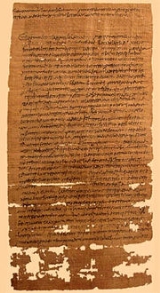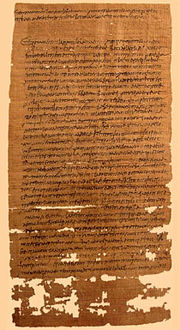
Babatha
Encyclopedia
Babatha was a Jewish woman who lived in the port town of Maoza in modern day Jordan
at beginning of the 2nd century CE
. In 1960, archeologist Yigael Yadin
discovered a leather pouch containing her personal documents in what came to be known as the Cave of Letters
, near the Dead Sea
. The documents found include such legal contracts concerning marriage, property transfers, and guardianship. These documents, ranging from CE 96 to 134, depict a vivid picture of life for an upper-middle class Jewish woman during that time. They also provide an example of the Roman bureaucracy
and legal system under which she lived.
 Babatha was born in approximately 104 CE in Maoza. Most likely the only child or the eldest daughter, she inherited her father’s date palm
Babatha was born in approximately 104 CE in Maoza. Most likely the only child or the eldest daughter, she inherited her father’s date palm
orchard upon her parents’ deaths. By 124 CE, she had been married and widowed with a young son, Jesus. She was remarried by 125 CE to Judah, owner of three date palm orchards in Ein Gedi
, who had another wife and teenage daughter. It is uncertain whether Babatha lived in the same home as the first wife or if Judah traveled between two separate households, as polygamy was still allowed in the Jewish community.
, Judah’s debts become part of her liability, indicating a financial equality. In 128 CE, a legal document shows that Judah took a loan without interest from Babatha, showing that she had control of her own money despite the union. Upon Judah’s death in 130 CE, she seized his estates in Ein Gedi as a guarantee against his debts which she had covered as stated in the marriage contract.
Another document of importance concerns the guardianship of Babatha’s son. In 125 CE, Babatha brought a suit to court against the appointed guardians of her orphaned son, citing their insufficient disbursement of funds. The document contains Babatha’s petition that full guardianship responsibility of her son and his property be transferred to her control.
. It is likely that Babatha fled with Miriam and her family from the imminent violence of the revolt. Because the documents were never retrieved and because twenty skeletal remains were found nearby, historians have suggested that Babatha perished while taking refuge in the cave.
Jordan
Jordan , officially the Hashemite Kingdom of Jordan , Al-Mamlaka al-Urduniyya al-Hashemiyya) is a kingdom on the East Bank of the River Jordan. The country borders Saudi Arabia to the east and south-east, Iraq to the north-east, Syria to the north and the West Bank and Israel to the west, sharing...
at beginning of the 2nd century CE
Common Era
Common Era ,abbreviated as CE, is an alternative designation for the calendar era originally introduced by Dionysius Exiguus in the 6th century, traditionally identified with Anno Domini .Dates before the year 1 CE are indicated by the usage of BCE, short for Before the Common Era Common Era...
. In 1960, archeologist Yigael Yadin
Yigael Yadin
Yigael Yadin on 21 March 1917, died 28 June 1984) was an Israeli archeologist, politician, and the second Chief of Staff of the Israel Defense Forces.-Early life and military career:...
discovered a leather pouch containing her personal documents in what came to be known as the Cave of Letters
Cave of Letters
The Cave of Letters is a cave located in the Dead Sea area that contained one of the largest caches of ancient documents and personal correspondence ever discovered in the land of Israel. Discovered in 1960 by Israeli archaeologist Yigael Yadin, the cave contained letters from Bar Kochba, leader...
, near the Dead Sea
Dead Sea
The Dead Sea , also called the Salt Sea, is a salt lake bordering Jordan to the east and Israel and the West Bank to the west. Its surface and shores are below sea level, the lowest elevation on the Earth's surface. The Dead Sea is deep, the deepest hypersaline lake in the world...
. The documents found include such legal contracts concerning marriage, property transfers, and guardianship. These documents, ranging from CE 96 to 134, depict a vivid picture of life for an upper-middle class Jewish woman during that time. They also provide an example of the Roman bureaucracy
Roman law
Roman law is the legal system of ancient Rome, and the legal developments which occurred before the 7th century AD — when the Roman–Byzantine state adopted Greek as the language of government. The development of Roman law comprises more than a thousand years of jurisprudence — from the Twelve...
and legal system under which she lived.
Life

Date Palm
The date palm is a palm in the genus Phoenix, cultivated for its edible sweet fruit. Although its place of origin is unknown because of long cultivation, it probably originated from lands around the Persian Gulf. It is a medium-sized plant, 15–25 m tall, growing singly or forming a clump with...
orchard upon her parents’ deaths. By 124 CE, she had been married and widowed with a young son, Jesus. She was remarried by 125 CE to Judah, owner of three date palm orchards in Ein Gedi
Ein Gedi
Ein Gedi is an oasis in Israel, located west of the Dead Sea, near Masada and the caves of Qumran.-Etymology:The name En-gedi is composed of two Hebrew words: ein means spring and gdi means goat-kid. En Gedi thus means "Kid spring."...
, who had another wife and teenage daughter. It is uncertain whether Babatha lived in the same home as the first wife or if Judah traveled between two separate households, as polygamy was still allowed in the Jewish community.
Analysis
The documents concerning this marriage offer insight to her status in the relationship. In their marriage contractKetubah
A ketubah is a special type of Jewish prenuptial agreement. It is considered an integral part of a traditional Jewish marriage, and outlines the rights and responsibilities of the groom, in relation to the bride.-History:...
, Judah’s debts become part of her liability, indicating a financial equality. In 128 CE, a legal document shows that Judah took a loan without interest from Babatha, showing that she had control of her own money despite the union. Upon Judah’s death in 130 CE, she seized his estates in Ein Gedi as a guarantee against his debts which she had covered as stated in the marriage contract.
Another document of importance concerns the guardianship of Babatha’s son. In 125 CE, Babatha brought a suit to court against the appointed guardians of her orphaned son, citing their insufficient disbursement of funds. The document contains Babatha’s petition that full guardianship responsibility of her son and his property be transferred to her control.
Death
The latest documents discovered in the pouch concern a summons to appear in an Ein Gedi court as Judah’s first wife, Miriam, had brought a dispute against Babatha regarding their late husband’s property. Therefore, it is assumed that Babatha was near Ein Gedi in 132 CE, placing her in the midst of the Bar Kokhba's revoltBar Kokhba's revolt
The Bar Kokhba revolt 132–136 CE; or mered bar kokhba) against the Roman Empire, was the third major rebellion by the Jews of Judaea Province being the last of the Jewish-Roman Wars. Simon bar Kokhba, the commander of the revolt, was acclaimed as a Messiah, a heroic figure who could restore Israel...
. It is likely that Babatha fled with Miriam and her family from the imminent violence of the revolt. Because the documents were never retrieved and because twenty skeletal remains were found nearby, historians have suggested that Babatha perished while taking refuge in the cave.
External links
- Babatha's Life and Times
- Bibliography on Babatha
- Transcriptions of some of Babatha's papyri Duke Databank of Documentary Papyri

